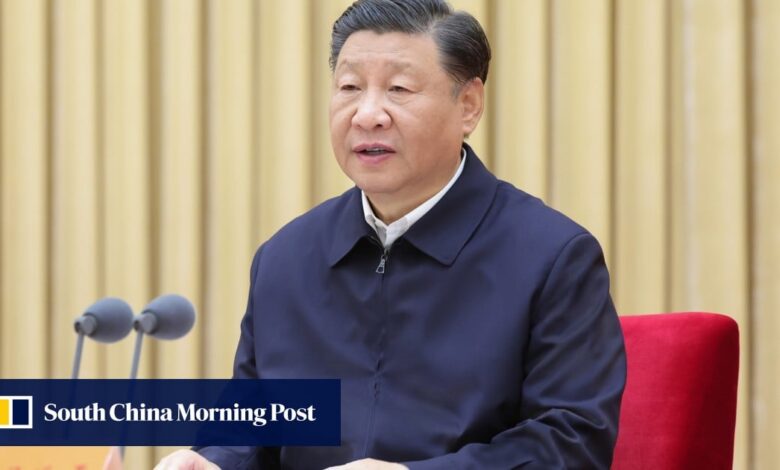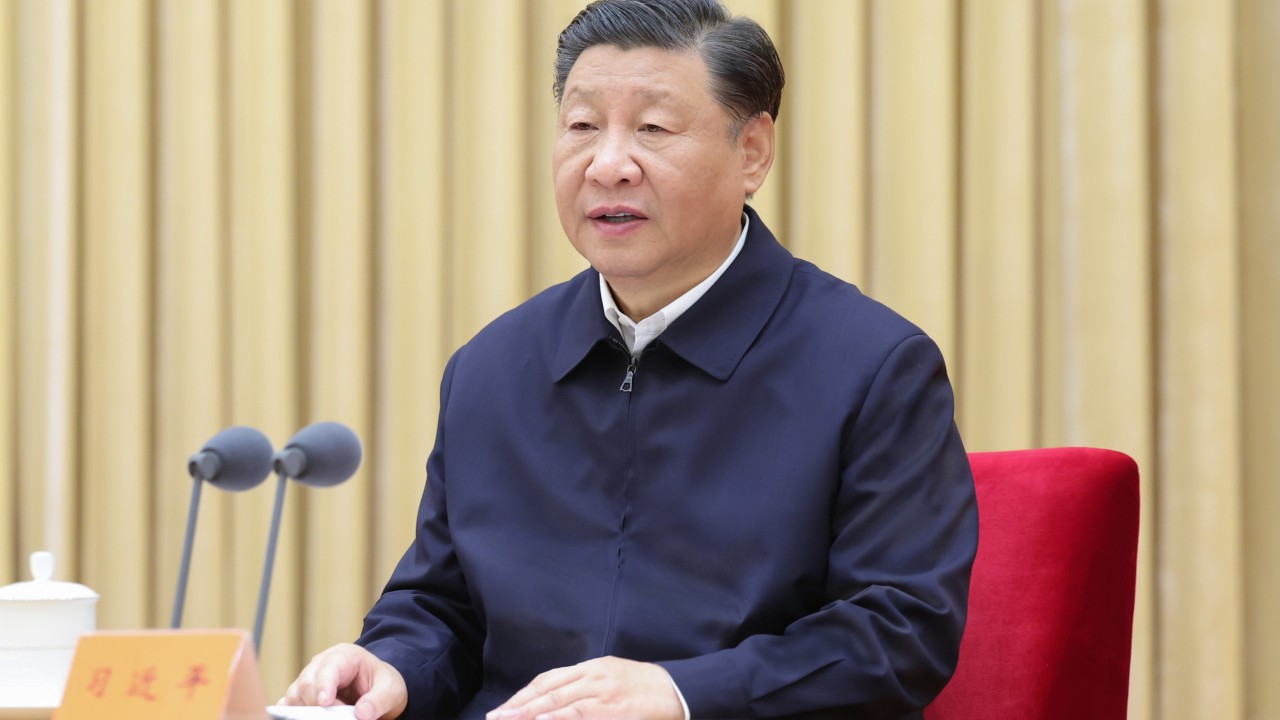Xi Jinping says preventing, resolving China’s financial risks are ‘eternal theme’ for Beijing

[ad_1]

At the same time, China also needs to strengthen the quality of its financial services to support key areas such as technology, advanced manufacturing, the green economy and small and medium-sized enterprises, which are crucial to job creation.
The message came as China is struggling with multiple financial challenges, with foreign investors pulling capital from China’s onshore stock exchanges amid slumping equity prices, while the yuan’s exchange rate against the US dollar has fallen to a 16-year low.
Some US$75 billion of capital exited the country in September, the largest net outflow since 2016, Goldman Sachs said in a report earlier this month, using its own measure of cross-border currency flow. That came after a US$42 billion flight in August as the capital and current account suffered deficits.
In Hong Kong, the Hang Seng Index has slumped to 17,112, from 31,183 in 2021, while the benchmark CSI 300 Index, which tracks the largest listed companies in Shanghai and Shenzhen, has fallen by 7.7 per cent so far this year.
The onshore exchange rate of yuan against US dollar dropped to 7.3176 on Tuesday, from 6.9050 at the start of this year, representing a depreciation of about 6 per cent.
Xi told the senior officials at the work conference that the government must focus on identifying and resolving hidden financial risks.
“We must be soberly aware that various contradictions and problems in the financial field are intertwined and influencing each other, and some are very prominent,” he said, according to state broadcaster CCTV.
“Financial supervision and governance capabilities are weak. The financial system must effectively improve its political position … and be determined to fundamentally solve these problems.”
[We’ll] make good use of the policy toolbox, better support rigid and improved housing needs
Beijing will concentrate on comprehensively strengthening supervision, as well as preventing and defusing risks, and it would firmly defend the bottom line of preventing systemic financial risks, the statement added.
The conference also mentioned setting up a long-term mechanism to prevent and tackle local debt risks and establishing a government debt management system that is aligned to high-quality development.
Meanwhile, it said China would improve the macro prudential management of property finance, and meet reasonable fundraising demands by private and state-owned developers.
“[We’ll] make good use of the policy toolbox, better support rigid and improved housing needs, accelerate the construction of three major projects, such as affordable housing, and build a new model of real estate development,” it added.
China’s economy turns corner: 7 takeaways from GDP, September activity data
China’s economy turns corner: 7 takeaways from GDP, September activity data
China’s property crisis has continued to worsen this year, marked by the fall of Evergrande Group and the debt fallout at Country Garden, despite rounds of policy stimulus.
Local government debts have reached 38 trillion yuan (US$5.2 trillion), but hidden debts – borrowed through local government financing vehicles (LGFVs) to skirt restrictions on government borrowing – are believed to be even bigger.
The International Monetary Fund estimated that the total LGFV debt had swollen to a record 66 trillion yuan this year, more than double the 30.7 trillion yuan in 2017.
Compared to previous ones that highlighted innovation, they now lay more emphasis on financial regulation and risk prevention
“The top leadership’s assessment suggested that the financial situation is severe,” said Liu Shengjun, chief economist of the China Financial Reform Institute, a private think tank in Shanghai.
“Compared to previous conferences that highlighted innovation, they now lay more emphasis on financial regulation and risk prevention.”
Liu estimated that anti-corruption would remain a tool used by Beijing to help tackle the problems in the financial sector.
He would also look forward to more details about the long-term mechanism on local debt management.
China seeks economic ‘strength down the road’ with 1 trillion yuan debt plan
China seeks economic ‘strength down the road’ with 1 trillion yuan debt plan
“It seems that they want to make some institutional changes to tackle the problems from the root,” he added.
Starting from late September, provincial governments have been allowed to issue refinancing bills to deal with the maturing debt, and the size has approached 1 trillion yuan (US$137 billion).
The new issuance will raise the budget deficit ratio to about 3.8 per cent of gross domestic product (GDP) – well above the 3 per cent target set in March.
The whole country can work together to enhance trust and prevent any contagion risks
However, Liu also warned that stronger control could lower the efficiency and vigour of state-owned financial institutions and result in more non-performing loans as they could be ordered to help tackle financial problems.
Wang Huiyao, founder of the Centre for China and Globalisation, a Beijing-based think tank, said the mechanism to resolve local debt woes was very timely, reflecting the efficiency of Beijing’s effort to address significant challenges.
“The mechanism can comprehensively coordinate and allocate resources to deal with the economic difficulties and challenges of individual localities,” he said.
“The whole country can work together to enhance trust and prevent any contagion risks. This is also one of the policies in the Chinese government’s toolbox.”
‘From Liu to He’: more economic authority for China’s vice-premier in new role
‘From Liu to He’: more economic authority for China’s vice-premier in new role
The conference was attended by the other six members of the Politburo Standing Committee and Politburo members, including Vice-Premier He Lifeng, who has recently been delegated more authority over financial and economic affairs.
Additional reporting by Frank Chen
[ad_2]
Source link





